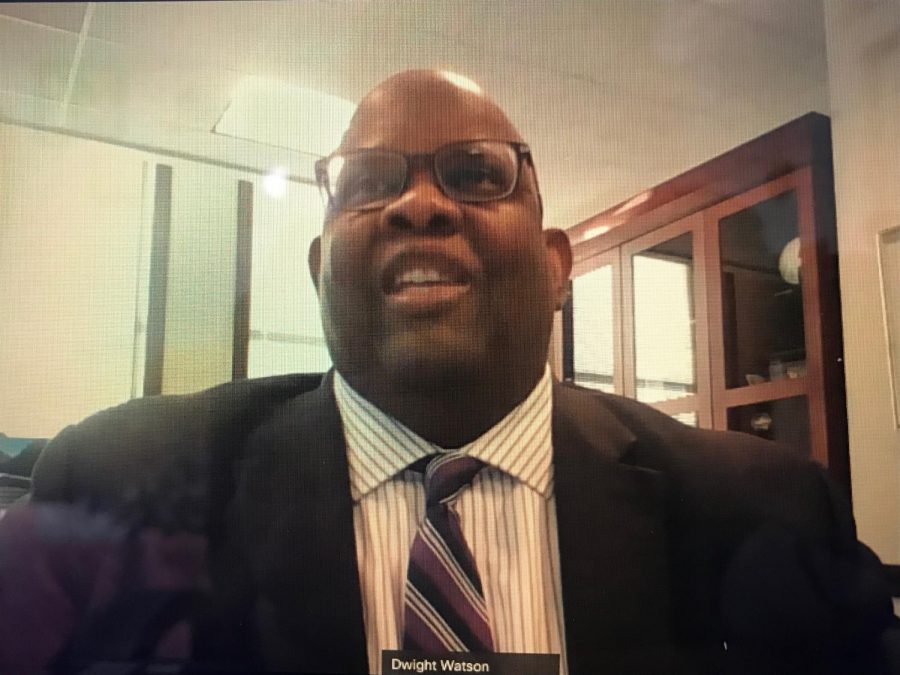Chancellor chats with campus
November 29, 2020
UW-Whitewater Chancellor Dwight Watson engaged university students, faculty and staff in a Chancellor Chat online event Nov. 17. The attendees were updated on the Budget Operations Committee, a reiteration of the COVID-19 Social Covenant, and information about fall and spring schedules.
“We are continuing to work on key budget strategies that we’ve already laid out, such as not filling unessential vacancies and reducing unbudgeted expenses,” said Vice Chancellor of Academic affairs Taryn Carothers. “There continue to be efforts by the cabinet and different leaders across campus who are working to close deficits.”
As of the fiscal year 2021, the university’s budget deficit is $5.4 million. In 2022, the deficit is projected to be $17.3 million. The BOC, which was added this fall and consisting of representatives from departments across campus, holds closed meetings on Tuesdays to come up with budget deficit solutions. They then present these solutions as official recommendations to the cabinet.
In response to a question about faculty lay-offs due to budget deficits, Watson assured listeners that the cabinet will announce any lay-offs by Feb. 1.
Long term plans and priorities for the budget are laid out in the university’s strategic plan, as well as in the ongoing program optimization. Said plans will be adjusted and modified as needed.
Also in relation to budget, the no-cost application from August through October was possible due to the UW-Whitewater Foundation Board’s grant of $65,000 dollars. There was a significant uptick in applications, but this may or may not have any effect on the actual fall 2021 enrollment numbers.
The panel also addressed COVID-19 expectations for faculty and staff upon leaving and returning to campus for the Thanksgiving recess.
“When we started addressing COVID-19, we came up with a Social Covenant. We didn’t want to have a lot of mandates and commands. What we wanted was to infuse within our ethos this social consciousness: you do the right thing because it’s the right thing to do. We want to continue that social responsibility,” said Watson.
Students and employees are expected, though not explicitly required, to get tested once before they go home and twice upon their return to Whitewater. This is because some tests can deliver a false negative result if a carrier of the virus has not yet developed symptoms. Chief Kiederlen recommended spacing out the return tests over at least two or three days to allow for maximum probability of testing accuracy.
Watson reiterated that these tests are to be conducted in adherence to the Social Responsibility Covenant. No consequences will incur if a returning student or faculty member does not get tested, but it is highly recommended.
It was also noted that tests will not be conducted at Rock County Campus. Individuals at Rock County may utilize Blackhawk Technical College’s free testing or come to Whitewater, who as a city has been working with UW-W to advertise testing and provide incentives for doing so.
The panel also addressed plans for the spring 2021 semester as well as for spring break. The spring semester will begin as scheduled on Jan. 19, offering four styles of classes mirroring those of Fall 2020: face-to-face, hybrid, remote and web-based.
As face-to-face implies, these classes will be meeting in-person with limited capacity. Hybrid courses involve students alternating in-person and online lectures. Remote courses refer to those that would be face-to-face were it not for the coronavirus pandemic, and web-based courses are those that are designed to be online, pandemic or not. For this reason, remote courses do not incur an additional fee, but the traditional online courses do.
Vice Provost Greg Cook reminded listeners of these class distinctions as well as the new dates for spring break, which will now be the week of April 19.
“After break, we come back to classes in the same format as before spring break. However, we reserve the right that if COVID conditions are serious at that time, there is the possibility that we will finish the spring semester in an all remote format,” said Cook.
Metrics determining if classes will continue as is or go remote following spring break include monitoring infection rates, talking with health officials and the Whitewater community, and holding university leadership discussions. The decision will be made based upon safety considerations regarding COVID-19’s present threat to the campus and city.
After an hour of dialogue, the Chancellor Chat panel wrapped up their updates, leaving listeners with a clearer understanding of how the university is moving forward this academic year.
To hear the discussion first-hand, watch the chat here. For specific questions regarding any of the information, contact the Office of Administrative Affairs at 262-472-1922.














